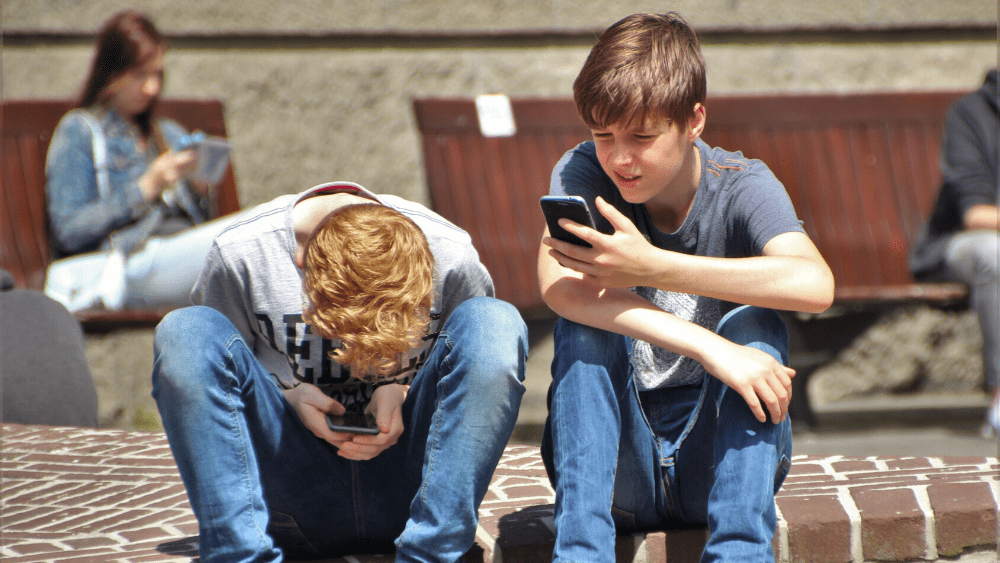If you don’t teach your kids about sex, Google will
Talking to teens in a porn-soaked culture
“It’s funny that in such a hyper-sexualised society, sex is still so taboo to talk about,” says “teen sexpert” David Kobler.
David and his wife Katie are speaking with Eternity about their mission to open up everyday conversations with kids about sex – in schools, at home, in youth groups and churches. As co-facilitators of Your Choicez, they have delivered seminars on sex and relationships to 202,000 students across Australia and New Zealand, as well as to many thousands of parents and teachers.
“Kids are, on average, seeing pornography at 11 years of age. So pornography is being used as a sex educator.” – David Kobler
One of the big topics they talk about is pornography.
“Growing up as a child in a digital generation, where parents aren’t necessarily the most savvy in that space, means that pornography has made things much more dangerous for children,” says David.
“We’ve seen a massive increase in New South Wales in child-on-child sexual assault. Kids are, on average, seeing pornography at 11 years of age. So pornography is being used as a sex educator, but it’s not interested in teaching young people about consent or love or intimacy or appropriate kinds of relationships. They can be seeing rape or incredibly violent themes as their initiation into sex.
“Obviously, that’s very confusing for a child.”
Another issue is sexting. “So often parents can be thinking that Instagram’s safe, Facebook’s safe. But the reality is it’s not a matter of if kids see pornography anymore, or if they find someone asking for a nude [picture of themselves]; these are questions of when this happens,” says Katie.
“We see issues with sexting and girls being pressured to do sexual things that they’re often not ready for at a young age.”
In fact, current statistics show that almost half of Year 10-12 students have already engaged in sexual intercourse.
“The average teenager will view 5000 images a day. And so often [they are] photoshopped, edited, sexualised, objectified kind of images.” – Katie Kobler
Katie adds that sexting and the pressure to be Instagram-perfect are also creating worrying body image issues for many teens.
“When we ask teens what pressures they’re facing, a lot of them will bring up body image. Research in Australia indicates that the average teenager will view 5000 images a day. And so often it’s not the kind of image that really represents the true story of masculinity or femininity – [they are] photoshopped, edited, sexualised, objectified kind of images.”
She continues: “Young people can be really struggling to see themselves as a whole person. They tend to think of themselves in terms of body parts.
“We do an activity where we ask them to think about: What do you like to do? What are you good at? What are the character traits that are helpful to other people in your life? And it can be a real challenge for them, as well as a really emotional experience.”
The Koblers first noticed the impact of this strange new digital world upon teenagers’ relationships and identities in their previous roles as youth pastors at Hillsong Church.
“We noticed that more and more kids were experiencing problematic relationships and sexual experiences and walking away from them broken. Yet, in our faith, sex and relationships – in the right time and the right environment – are meant to be a real blessing,” says Katie.
“So we had a desire to teach about this in schools.”
“As Christians, we get the opportunity for a small amount of time when children are very little to frame the conversation how we want.” – Katie Kobler
The Koblers believe one of the main ways to help kids deal with these issues is to have open conversations – first, at home. This becomes evident when they provide teens the opportunity to ask anonymous questions at the end of their seminars.
“In a group of, say, 100 students, I probably get about ten questions like: ‘How do I tell my mum I’ve had sex? How do I tell my mum I want to get an STD check-up? How do I tell my parents I’m gay?’ These teens just want to know ‘how do I connect with my parents? I need support, I need help.’ And it’s just so heartbreaking,” Katie shares.
“It is important for us as parents to be setting up internet filters and that kind of thing, but if you haven’t had a conversation with your kid about what to do in those situations, they’re not equipped. They’re not ready to deal with that stuff.”
As a mum of three young children – aged nine, six and three – Katie adds that conversations about sex need to start well before the high school years: “We always say, if you haven’t told your kids about sex before they’re nine, ten, 11, somebody else has, and it’s probably not a person that you would want educating a child around those topics …
“As Christians, we get the opportunity for a small amount of time when children are very little to frame the conversation how we want it to be framed.”
David adds: “We have the hope that kids feel like, instead of Google, they can go to their parents to ask the tougher questions. We have some beautiful stories of parents whose kids have asked them really big questions about serious sexual things, and the only reason it happened was because they started these conversations when the kids were really little and there was nothing off limits.
“We’ve also had the other side of the coin, where kids were Googling something they’ve overhead on the school bus that they felt they couldn’t tell their parents.”
“Because there’s this culture of shame, often kids can be walking away from God just because they’re struggling with this stuff.” – Katie Kobler
This responsibility for communication also extends to the church. The Koblers suggest, first, educating youth pastors around these topics and, second, allowing space at church and in youth groups for non-judgmental conversations about sex and relationships.
When it comes to the church’s teaching on sex before marriage, David says: “I think sometimes the approach has been quite judgmental or simply ‘just don’t do it’, rather than talking about how and why.”
“We really need to encourage young kids to search what do they really believe about this. Often they haven’t spent the time exploring ‘why do I believe this?’ so they can be confident in their decision.
“This is where churches can really help. Everyone together needs to stop avoiding these topics and say ‘let’s talk about them and explore them.’ We don’t have to have all the answers, but we’ve got to help kids go on that journey of seeking God, reading the Bible and considering ‘what do I believe God wants from me around my sexuality?’”

David and Katie Kobler from Your Choicez deliver a seminar to secondary students
Katie adds that the church also needs to foster a “response of grace as opposed to a response of shame, which unfortunately we often see.”
“The reality is that so many kids will struggle when it comes to pornography. So many will struggle when it comes to making healthy choices that are right for them when it comes to sex. Because there’s this culture of shame, often kids can be walking away from God just because they’re struggling with this stuff. It’s just not meant to be that way. So we need to open up the conversation and provide a platform of grace and a soft spot for kids to land when they struggle.”
Finally, these conversations also need to cover what positive, healthy relationships look like.
“If that conversation isn’t had, it can be really difficult for teens to live life with those values and ideals at the forefront guiding them. We encourage young people to consider their decisions, what’s right for them and what they really want out of relationships,” says David.
“It’s amazing just by opening the door to that, seeing young people go ‘yeah, actually, I don’t want a relationship just based on this one aspect of me [sexuality] and I do have that deep human desire to be loved for who I am as a person.’
“We love seeing that the kids desperately want to have conversations about this – it’s something they really, really desire.”
David and Katie give their top three tips for parents on helping teens navigate sex and relationships in a digital world:
1. Create digital-free spaces
“We always encourage parents not to let teens have phones in their rooms, and especially inside their bed while they’re falling asleep. Between 10pm and 1am is the most problematic time for young people to experience online bullying, highly emotive issues [due to online interactions] and also to access pornography. If parents can create that culture in their home, where phones are not in bedrooms, it really can protect young people in such a significant way,” says Katie.
2. Lead by example
“One of the frustrations that a lot of young people have is their parents putting restrictions in place [about digital devices], but then the parents lie in bed themselves on their devices or they sit there having a conversation and they’re checking emails. So it’s important for parents to look at themselves. If they want to create a space where their kids can talk to them face to face, they’ve got to not sit with their phone in their hands and they’ve got to do family dinners where devices are away,” David says.
3. Have pre-emptive conversations
“Always start the conversation early. You be the one who introduces your kids to terminology. We think the first time a child ever hears the word ‘pornography’ should be from their parents. They should hear about sex from their parents first. They should know what sexual harassment is before they’ve ever seen an example of it in the real world. It really just sets kids up to succeed and it also helps that relationship. When kids see or hear things that Mum or Dad talked to them about, there’s a place for them to go back and sort out how do I feel? What do I think?” says Katie.
More resources, as well as information about seminars, is available at yourchoicez.com.au
Email This Story
Why not send this to a friend?

